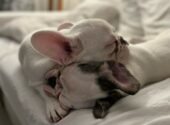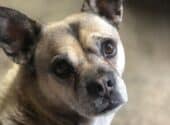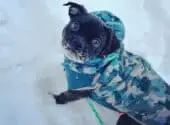Have you recently got yourself a new baby pug? We can’t say we’re not jealous!
You must be so in love with your new little friend, and you have every right to be. Baby pugs are super cute, and they have such a nice temperament.
They are just fun and happiness in small wrinkly packages! Baby pugs are the most fun puppies, they are really playful and really energetic, and are crazy to be around.
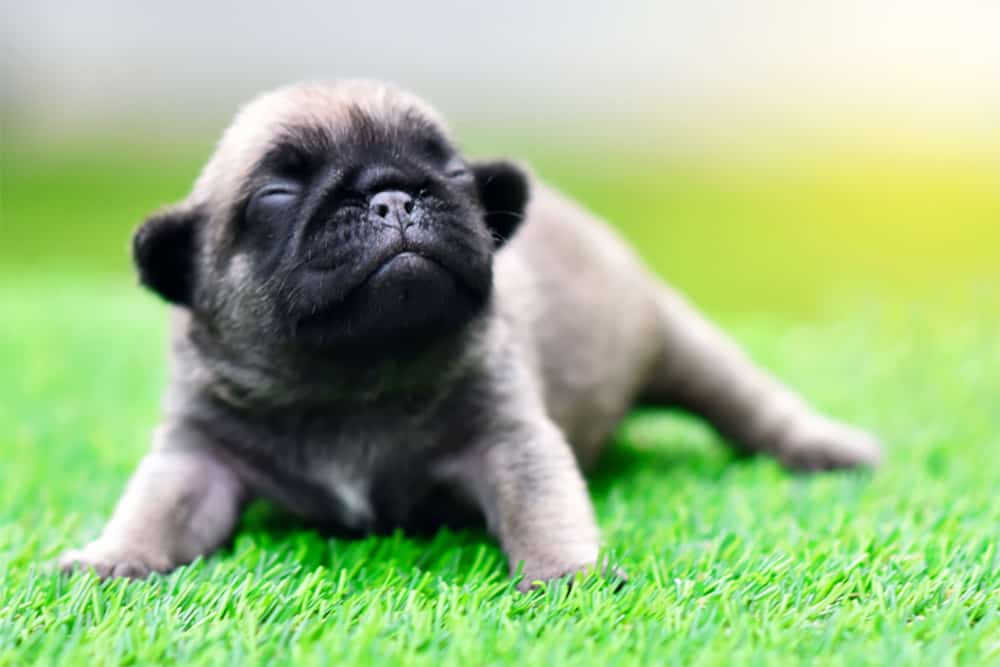
Baby pugs love playing tug of war with you, or fetch, although they only have little legs so don’t be too over-ambitious with throwing. And, as puppies they absolutely lap up hide and seek. How cute!
Sometimes, you might notice that your baby pug is breathing hard, and it might not seem to affect your dog but nevertheless, you wonder if this is something you should be worried about.
So, read on to find out a few reasons as to why your baby pug might be breathing hard, and this will inform you on the times where it is nothing to worry about.
Genetic Makeup
So, it is time to get a little bit sciency for a second… Pugs are susceptible to breathing problems because of their flat faces. However, when a baby pug breathes hard it is usually due to other reasons than why an adult pug would breathe hard.
When your baby pug is breathing hard, this is most likely due to exertion from playing or running, remember what we said earlier about little legs… the only time you need to be worried is when your pug is breathing hard and it is not in relation to exertion or play.
Fast Breathing In Baby Pugs: Exertion
Playing is one of the key activities that makes puppyhood so fun and enjoyable for your furry friend.
As part of their growth and development, puppies play not just to have fun with their owner but to learn how to interact with their surroundings.
Playing also helps puppies to learn about boundaries with adult dogs, boundaries with their owner and it helps to teach them play and behavioural skills as they enter adulthood.
Puppies must be with their mothers and fellow puppy siblings until they are at least ten weeks old, because although as their owner you will become their greatest teacher, their mother and siblings will be their best teachers.
The most important lessons that your pug baby, or any puppy for that fact can learn is through play.
For instance, young puppies will not know that their teeth and claws can hurt other people, but when they play with their mother then they will learn not to bite or claw. In fact, to a new owner, the level of excitement that a puppy can reach while playing might seem alarming.
And, after an intense play session your puppy might be breathing quite hard, but this is nothing to worry about as your puppy will just be tired and breathing hard.
Playing and exercising with your puppy is the best thing you can do for their growth and development. In fact, puppies that do not get enough exercise can sometimes resort to more angry behavior, like chewing or excessive barking.
Let’s be honest, no one wants their shoes to be chewed and shredded to pieces. So, if your baby pug seems completely fatigued after some crazy playtime, and this is clear through their heavy breathing, then you are doing a brilliant job at keeping your puppy active.
An additional note about pug puppies is that they tend to tire more quickly than other breeds of dogs who have longer snouts, this is because pugs have brachycephalic (or flat) faces.
Your baby pug might have trouble breathing if they are too hot or if they have been exercising too hard due to its flat face.
The Difference Between Heavy Breathing And Struggling To Breathe
So, as an owner, you should be able to notice if your puppy is just tired, or if your puppy is genuinely struggling to take a breath. There is a difference between fast breathing from playing, and labored breathing stemming from brachycephaly.
We recommend that pug puppies should be played with in cooler environments and they may need more breaks than other furry friends.
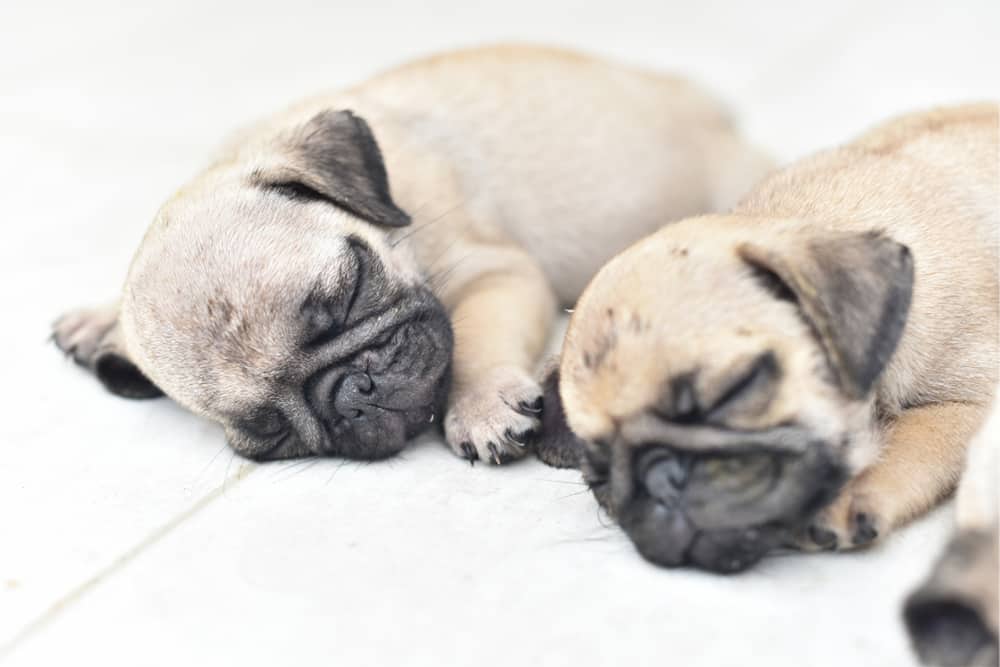
We recommend if you are playing a game of fetch to throw a ball over shorter distances and to encourage your puppy to drink water in between playing.
We absolutely do not advise that you stop playtime with your puppy altogether, just bear in mind your pug’s genetic makeup.
Other Reasons Why Your Pug Baby Might Be Breathing Fast
Worms
Unfortunately, worms can affect a lot of puppies – not all, but a lot. Worms are so frequent amongst puppies that all puppies are given deworming treatments with their first visits to the veterinary clinic.
What should you look for in your puppy to see if they have worms? Well, if your puppy has a round, taut belly along with heavy panting then this is a strong indication that your puppy might have worms.
Worms are rarely a dangerous affliction to puppies when it is treated early enough. Now, only a veterinarian can give you the medication that your puppy will need, so if you have even the slightest suspicion that your puppy has worms then take them for a check up straight away.
Heatstroke
It is true that heatstroke in dogs is just as serious as the name suggests, and heavy or fast breathing is just one sign that your dog might have heatstroke. Other symptoms include drooling, diarrhea, vomiting, a high temperature (over 104 degrees), and in some cases seizures.
If you suspect heatstroke in your baby pug, then you must act quickly.
Some of the things that you can do to lower your pug’s temperature are to move them to a cooler area. For instance, if you are outside then find a shaded area, or if you are indoors then a cool flooring surface such as tile will work well.
If your baby pug will let you then you can also place ice packs on your baby pug’s stomach and chest.
Lastly, if your baby pug loves bath time then bathe them will cool water. It is important to use cool water and not cold water, as cold water can restrict blood flow and be detrimental to trying to cool your baby pug down at the appropriate pace.
Once your puppy has cooled down, take them to the veterinarian’s office – never just assume that if your pug baby is acting normal that they do not need any vet care.
Heat stroke is a major medical emergency, and you should always follow up with your vet if you suspect this is what your puppy has struggled with.
Pain Or Injury
Another reason why your puppy could be panting is because they are in pain. Your puppy might not yelp or cry if it is in pain, and sometimes the only sign that your little pup is hurt will be the way that they are breathing.
If your pug pup is taking fast and frantic breaths, or if they are breathing shallowly, or if they are breathing heavily then all of these could indicate that you pug pup is in distress.
Other less obvious signs could be that your pup will yelp if you pick them up, they may excessively lick a certain area, or they may be more hesitant when it comes to running and jumping around.
It is extremely frustrating, and also upsetting that as an owner you do not always know if your puppy is in pain. However, as an owner all you can do is look out for any changes in your pup.
Now you know some of the ways that your baby pug might be trying to tell you that they are in pain or discomfort.
But, the bottom line is that if you are worried about your baby pug breathing heavily, then actually, you might not have anything to worry about. Their flat faces mean that they are more prone to heavy breathing, as an owner, we assure you that you will be able to see if there is something wrong with your pup.

